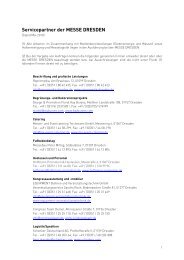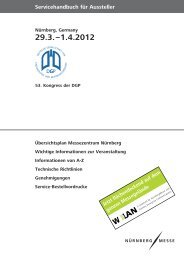Instruction Sheet - Agentur KONSENS
Instruction Sheet - Agentur KONSENS
Instruction Sheet - Agentur KONSENS
Create successful ePaper yourself
Turn your PDF publications into a flip-book with our unique Google optimized e-Paper software.
German Freight Forwarders’ Standard<br />
Terms and Conditions (ADSp)<br />
(The following text is a translation from the German language original.<br />
In case of disputes the German language original of the ADSp are<br />
applicable)<br />
Preface<br />
The terms and conditions are recommended for use, starting January 1st ,<br />
2003, by the Federal Association of German Industry, the Federal Association<br />
of German Wholesalers and Exporters, the Federal Association of German<br />
Freight Forwarders and Logistics Operators, the Association of German<br />
Chambers of Industrie and Commerce, and the German Association of<br />
Retailers. This recommendation is not obligatory. Contract parties can formulate<br />
different agreements.<br />
1. Interest of the principal and due care<br />
The freight forwarder shall act in the interest of his principal and fulfil<br />
his duties with due care.<br />
2. Area of application<br />
2.1 The ADSp apply to all contracts for the transportation of goods, irrespective<br />
of whether they concern freight forwarding, carriage, warehousing<br />
or other services common to the forwarding trade; these also<br />
include logistical services commonly provided by freight forwarders in<br />
connection with the carriage or storage of goods.<br />
2.2 In the case of forwarding services regulated by sections 453 to 466 of<br />
the German Commercial Law (HGB), the freight forwarder is only<br />
responsible for arranging the necessary contracts required for the performance<br />
of these services, unless other legal provisions take precedence.<br />
2.3 The ADSp are not applicable for contracts that deal exclusively with<br />
– packaging,<br />
– the carriage of removal goods and their storage,<br />
– crane lifting, assembly jobs or heavy lift and high volume transports,<br />
except for normal transhipment services of the freight forwarder,<br />
– the carriage and storage of goods to be towed or salvaged.<br />
2.4 The ADSp are not applicable for transport contracts with consumers.<br />
Consumers are natural persons concluding the contract for reasons<br />
other than commercial or in pursuit of their professional activities.<br />
2.5 If trade customs or legal provisions differ from the ADSp, the ADSp<br />
take precedence unless these legal provisions are mandatory.<br />
For contracts of carriage by air, sea, inland waterways or for multimodal<br />
transports different contractual arrangements may be made in<br />
accordance with the terms of carriage devised for these transports.<br />
2.6 The freight forwarder is authorised to agree to normal standard terms<br />
and conditions of third parties.<br />
2.7 In the relationship between a principal freight forwarder and an intermediate<br />
freight forwarder, the ADSp are deemed to be the general<br />
terms and conditions of the intermediate freight forwarder.<br />
3. <strong>Instruction</strong>s, transmission errors, contents, special type of goods<br />
3.1 Forwarding instructions, other instructions, directives and communications<br />
are valid even if given informally. Subsequent modifications must be<br />
specifically identifiable as being amendments.<br />
The burden of proof for the correct and complete transmission lies<br />
with the party referring to it.<br />
3.2 If statements must be made in writing, they are deemed to having<br />
been made in writing when using electronic data communication or<br />
any other machine readable form for as long as the originator of the<br />
message is identifiable.<br />
3.3 The principal must inform the freight forwarder, at the time of giving<br />
the instructions, that the transport contract concerns:<br />
– dangerous goods<br />
– live animals and plants<br />
– perishables<br />
– valuable goods and goods with an inherent risk of theft<br />
3.4 The principal must specify in his instructions addresses, marks, numbers,<br />
quantity, nature and contents of the packages as well as declaring the<br />
properties of the goods, as required by section 3.3, the goods value for<br />
insurance purposes and any other information relevant for the proper<br />
execution of the forwarding instructions.<br />
3.5 In the case of dangerous goods, the principal must inform the freight<br />
forwarder in writing – at the time of giving the instructions – of the<br />
exact nature of the hazard and, if appropriate, about precautionary<br />
measures. In the case of dangerous goods subject to the law for the<br />
carriage of dangerous goods or other goods, the carriage of which is<br />
subject to specific regulations regarding dangerous goods, their handling or<br />
their disposal, the principal has to make the necessary declarations required<br />
for the proper execution of the forwarding instruction, especially the<br />
classification in accordance with the regulations for dangerous goods.<br />
Info 5<br />
3.6 The principal must inform the freight forwarder about particularly<br />
valuable goods or goods with an inherent risk of theft (e.g., cash,<br />
precious metals, jewellery, clocks and watches, precious stones,<br />
works of art, antiquities, bank or credit cards, valid telephone cards<br />
or other means of payment, bonds, shares and similar, foreign<br />
currencies, documents, spirits, tobacco, entertainment electronics,<br />
telecommunications devices and accessories) and goods with an<br />
actual value of EUR 50 per kg or more well in advance to allow the<br />
freight forwarder to decide about acceptance of the goods and to<br />
take measures for a safe and secure execution of the forwarding<br />
job.<br />
3.7 If a forwarding instruction does not comply with the terms stated in<br />
sections 3.3 to 3.6, the freight forwarder has the option to<br />
– refuse acceptance of the goods<br />
– return goods already accepted or to make them available for<br />
collection<br />
– ship, transport or store them without the need to notify the principal<br />
and to charge an extra, appropriate fee, if the safe and secure<br />
execution of the instruction causes extra costs.<br />
3.8 The freight forwarder is not obliged to check or supplement the<br />
statements made regarding sections 3.3 to 3.6.<br />
3.9 The freight forwarder is not obliged to check the authenticity of<br />
signatures on any messages or documents relating to goods, nor to<br />
check the authority of the signatories, unless there exist reasonable<br />
doubts concerning the authenticity or authority.<br />
4. Packaging, provision of loading and packaging aids, weighing<br />
and checking<br />
4.1 Unless specifically stated, the forwarding instruction does not cover<br />
4.1.1 the packaging of the goods,<br />
4.1.2 the weighing, checking, measures to preserve or enhance the goods<br />
and its packaging, unless this is customary for this kind of transaction,<br />
4.1.3 the provision or exchange of pallets or other loading or packaging<br />
aids. If they are not swapped one-for-one, they are only picked up as<br />
part of a new forwarding instruction. This does not apply if the<br />
exchange is intentionally not carried out by the freight forwarder.<br />
4.2 The services under section 4.1 are charged for separately.<br />
5. Customs clearance<br />
5.1 The instruction for shipment to a destination in another country<br />
includes instructions for customs clearance, if this is necessary for<br />
arranging the transport to the place of destination.<br />
5.2 The freight forwarder is entitled to an extra fee for the customs<br />
clearance, over and above the actual costs incurred.<br />
5.3 The instruction to forward bonded goods or to deliver them free<br />
house, authorises the freight forwarder to effect the customs<br />
clearance and to advance customs and excise duties and fees.<br />
6. Packaging and marking obligation of the principal<br />
6.1 The packages have to be clearly and durably marked by the principal<br />
to facilitate their proper handling, e.g. addresses, marks, numbers,<br />
symbols for handling and properties; old marks must be removed or<br />
made illegible.<br />
6.2 In addition, the principal is under obligation:<br />
6.2.1 to mark all packages belonging to the same consignment in such a<br />
way that they are easily recognised as forming one consignment,<br />
6.2.2 to prepare packages in such a way that they may not be accessed<br />
without leaving visible trace (adhesive tape, bands, etc. are only permissible<br />
when they are individually designed or otherwise difficult to<br />
imitate; foil wrapping must be thermally sealed);<br />
6.2.3 in case of a consignment being part of a forwarders consolidation,<br />
to group the individual packages or units of this consignment into<br />
larger units if their strap length (largest circumference plus longest<br />
side) is less than 1 meter;<br />
6.2.4 to combine a consignment of hanging garments consisting of several<br />
individual units into wrapped units for easier handling;<br />
Please turn over!<br />
47






